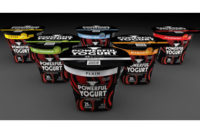Examining ultrafiltration and its prospects in the dairy industry
Processors should weigh the benefits and cost of UF within milk, yogurt and cheese.

Photo courtesy of S_Bachstroem on gettyimages.com

Ultra-filtration, also known as UF, is a filtration process that uses a membrane to selectively concentrate protein, fat and insoluble salts. It is a pressure-driven crossflow filtration process in which the feed solution flows perpendicular to the direction of the filtrate flow. This process can be used to separate particles in the range of pore size 0.01- 0.1 µm with an operating pressure and temperature of 30 to 100 psi and 40 to 80 degrees Fahrenheit, respectively. The most common membrane types are polymeric (organic) and ceramic (inorganic).
The global ultrafiltration membrane market is expected to reach $3.7 billion by 2031 from its value of $1.5 billion in 2021, according to the report published in Allied Market Research. UF process has wide applications in the food industry including the production of soy protein isolate, concentration of egg whites and gelatin solution, clarification of fruit and vegetable juices, and beer to name a few.
The dairy industry also uses UF for a variety of applications, including:
- Production of milk and/or whey protein concentrates (MPC and WPC) and isolates (WPI) that are used as ingredients for infant formula, cheese, yogurt, sports nutrition products, meat, and bakery products.
- Standardize and increase the concentration of protein and calcium and remove lactose in milk.
- Preconcentration of cheese milk to increase protein, optimize gel formation, and maximize yield and plant throughput.
- Produce various types of cheese including Mozzarella, Cheddar, and Feta by separating the whey proteins from the curds.
- UF milk and its resulting dried derivatives can be used as optional dairy ingredients in yogurt.
- Remove unwanted enzymes and harmful contaminants such as mycotoxins.
- Produce functional dairy ingredients such as lactoferrin and lactoperoxidase that have antimicrobial properties.
UF is regulated by various government agencies around the world to ensure the safety and quality of dairy products that are produced using this technology. In the United States, both the Food and Drug Administration (FDA) and the U.S. Department of Agriculture (USDA) are responsible for regulating the use of UF in the production of dairy products. MPCs and MPIs that are produced using UF must meet the same standards as those produced using other methods.
Additionally, there are specific guidelines for the production and labeling of MPCs and MPIs, including requirements for the types of milk that can be used and the processes that can be applied. Specific standards also have been established to regulate the use of UF in the production of cheese and other dairy products made from milk.
Despite its many benefits, UF also has some challenges that should be considered. One of the main concerns of UF is its relative cost compared to other filtration methods, such as microfiltration and reverse osmosis. Additionally, UF membranes can be prone to fouling, which might reduce their efficiency over time. Fouling, however, can be reduced by selecting the right membrane module, process configuration, membrane cleaning, and pretreatment. Membrane cleaning is done when there is an increase in transmembrane pressure or when there is a decline in permeate flux. Factors that can significantly influence the life of membranes include proper CIP temperature and time, pH of the cleaning agents used, and maintaining ideal turbulence during cleaning.
To summarize, ultra-filtration has significant potential in the dairy industry for separating milk proteins, improving product quality and stability, and recovering valuable ingredients from byproducts. Although UF is a versatile and efficient filtration process applicable to a wide range of dairy products, it is important to consider its costs and maintenance requirements when deciding whether it is the right filtration technology for a specific application.
References:
Kumar, P., Sharma, N et al., (2013) Perspective of Membrane Technology in Dairy Industry: A review. Asian Australas.J. Anim. Sci. Vol 26, No.9: 1347-1358.
Reig, M., Vecino, X., et al., (2021) Use of Membrane Technologies in Dairy Industry: An Overview. Foods, 10,2768
Ultrafiltration market. Allied Market Research. https://www.alliedmarketresearch.com/ultrafiltration-market-A17427Looking for a reprint of this article?
From high-res PDFs to custom plaques, order your copy today!






